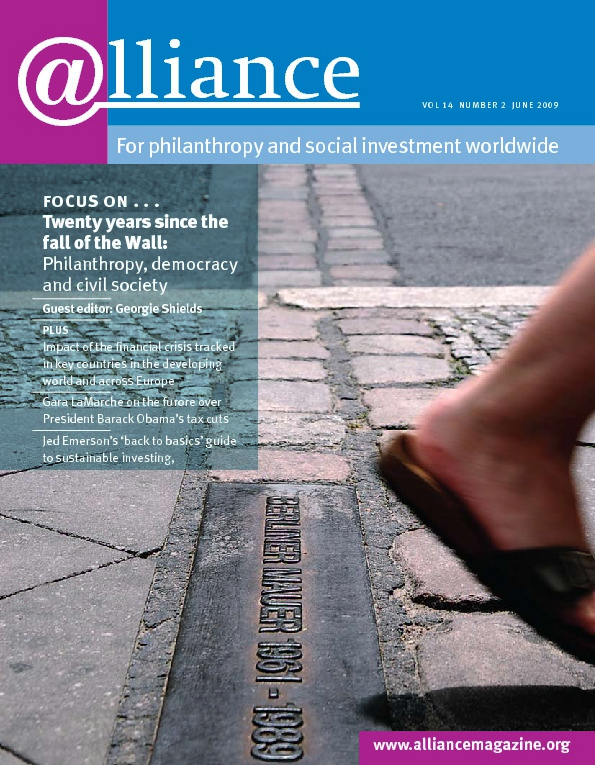Across Europe, the financial crisis is cutting further into foundation assets and reducing investment incomes, forcing tougher choices about programme priorities in a time of growing needs. Alliance has reports on the crisis from France, Russia, Portugal, Germany and the UK. We welcome contributions on the impact and implications of the crisis for future issues: please send to caroline@alliancemagazine.org
EFC tracking the troubles
The European Foundation Centre (EFC) and the US-based Foundation Center have started work on a web-based service to track responses by European foundations to the economic crisis. The portal, which will be accessible from the EFC homepage, aims to encourage foundations across Europe to share information, ideas and strategies about coping with the downturn.
The service will have news feeds from both EFC and external sources, information on how the crisis is affecting European foundations’ grantmaking and operations, analysis, forecasts and an interactive map of grants made by EFC members either directly in response to the economic crisis or more generally tackling aspects of poverty.
The portal’s launch follows a 2008 survey among EFC members on the impact of the unstable economy on their activities and future prospects. Nearly half of respondents expected their foundations’ budget for grantmaking and/or operating programmes to decrease in the next two years, while two-thirds said they were considering significant changes in their investment strategy and asset allocation in the future.
For more information
http://www.efc.be/projects/crisis
http://foundationcenter.org/focus/economy
Portuguese poverty action
The Calouste Gulbenkian Foundation has joined forces with a group of Portuguese organizations, including banks, media groups, telecommunications companies, the EDP Foundation and the Millennium BCP Foundation, to launch a solidarity campaign to tackle the increasing risk of poverty in Portugal during the financial crisis.
The campaign has started with a jointly funded €1 million, with the aim of increasing this by challenging other institutions and the public to contribute. The initial beneficiaries will be families in four regions struck by unemployment who do not benefit from any specific welfare payments, in particular those families with preschool age children or elderly or handicapped family members. The campaign will provide funds to three Portuguese charities operating in these regions: Caritas, the Portuguese Red Cross (Cruz Vermelha Portuguesa) and the Portuguese Federation of Food Banks (Federação Portuguesa dos Bancos Alimentares contra a Fome).
Source
European Foundation Centre, 7 April 2009
New French thinking
The crisis is inspiring new thinking among French foundations, with this year’s 200-strong conference of the Centre Français des Fondations in Paris highlighting possible changes in investment and operational strategies.
Faced with reduced returns from shrinking endowments, foundations were advised to employ long-term financial strategies and diversify investments away from the stock market to develop new sources of income. One recurring piece of advice was for foundations to build up a working capital reserve to enable them to be counter-cyclical with support when other sources dry up.
To make and meet commitments, speakers emphasized the benefits of a financial framework in which full budgets are set aside from the outset of a multi-year grant to avoid any later funding worries, with one corporate foundation noting that it had recently approved a five-year programme budget.
Despite the crisis, there were warnings against focusing on endowments at the expense of mission, with foundations urged to maintain their role in addressing society’s by acting in solidarity with grassroots organizations that may be finding it difficult to meet basic costs, suhc as salaries.
For more information
http://www.cf-fondations.fr
 Social banks and faith-based charities defy crisis in UK
Social banks and faith-based charities defy crisis in UK
Both UK social banking and faith-based charities are defying the financial crisis, which will be the subject of new research, while volunteering may be seeing an upsurge and televised appeals have raised record sums.
Among social banks, profits at Co-operative Financial Services rose almost 70 per cent, Unity Trust Bank doubled its lending to non-profits in 2008, Charity Bank increased its loans by almost 40 per cent, and Triodos Bank lending was up 32 per cent. All four institutions saw customer deposits rise as a reaction to the social banks’ ethical stances, their limited exposure to toxic debt, and greater competitiveness as interest rates generally fell.
Faith charities may well survive the financial crisis better than other organizations, new fundraising figures suggest. The charity Islamic Relief raised £4.3 million during Ramadan, its highest total in 25 years, while Muslim Aid saw a 10 per cent increase in donations during the holy month, to £2.2 million. Institute of Fundraising chief executive Lindsay Boswell advised all organizations to learn from faith charities: ‘It’s due to the relationship they have with their supporters. It’s the unity and sense of community.’
The Charity Commission regulator has commissioned research on how trusts and foundations are reacting to the crisis and the impact this has on the charities that they fund. Due to be published in June, the research by Diana Leat, former director of the creative philanthropy programme at Carnegie UK Trust, will be part of a series of Charity Commission reports on the economic downturn.
Among UK charities reporting more people offering their time is employee volunteering network Pilotlight, which last year projected a fall but has since seen a 9 per cent rise in applications to its London operation and a doubling of membership in Pilotlight Scotland, which was launched last year. And the BBC’s regular televised Comic Relief and Children in Need appeals have raised record sums of £41.8 million and £120 million respectively.
Sources
The Guardian, 12 November 2008
Philanthropy UK, 6 April 2009
Pilotlight, 22 April 2009
Professional Fundraising, 25 March 2009
 Germany Hans Fleisch
Germany Hans Fleisch
Cooperation the main strategy
New financial realities are prompting German foundations both to cut spending and to work more closely together as their income and endowments shrink.
The legal guidance for German foundations to conserve the value of their endowment capital leads to a very conservative asset allocation, so most have no stocks or other risky assets, while even the largest rarely have more than 10 per cent of their investments in stocks. While most German foundations have a relatively low income compared to their assets, the minor risks in their asset allocation mean the present crisis should not substantially harm their endowments, with reductions in their value of about 10 per cent on average.
However, because the guidance also requires foundations to spend most of the income from their assets within a year, low interest rates will have a faster and larger effect on their work, cutting income in 2009 by probably around 10 per cent, with further cuts to come. That income fall is prompting foundation boards to examine their administrative costs, with the employment of new staff, for example, often being postponed. But the main strategy of German foundations to overcome the moderate shortfall is simply to approve less funding for new projects and to search for co-financing partners. This year’s annual conference of the Association of German Foundations on 6-8 May in Hanover had one major topic: cooperation.
Hans Fleisch is general secretary of the Association of German Foundations. Email hans.fleisch@stiftungen.org
 Russia Maria Chertok
Russia Maria Chertok
Regions hit but not all news is bad
The economic crisis has spread to the Russian regions. This is affecting corporate contributions although individual donations are being maintained. Corporate donors cut their spending to the Saratov Community Foundation, for example, and to NGOs in that region by up to 50 per cent, as compared to 2008 figures, according to foundation director Ilya Chukalin, who added that calls for funding from local charities had increased dramatically. Although the current difficulties did not lead to massive collapse of the banking system, some of the regional banks faced serious problems and even lost their licences, again affecting contributions to regional NGOs.
But fundraising charities keep reporting that their private donations flow is holding up and even increasing. One reason for this is the active engagement of the Russian media, which now more regularly and positively reports on philanthropic events and highlights the impact of the crisis. The media is even actively debating charity tax issues, which may put pressure on the government. In President Dmitry Medvedev’s first interview with the Russian media, one journalist asked about the taxation of charitable activity.
For CAF Russia itself, the last couple of months have been better than expected, with all but one corporate partner confirming commitments at the same level as 2008, while the flow of private donations through its online and payroll instruments are steadily growing.
Maria Chertok is Director, CAF Russia. Email mchertok@cafrussia.ru





Comments (0)